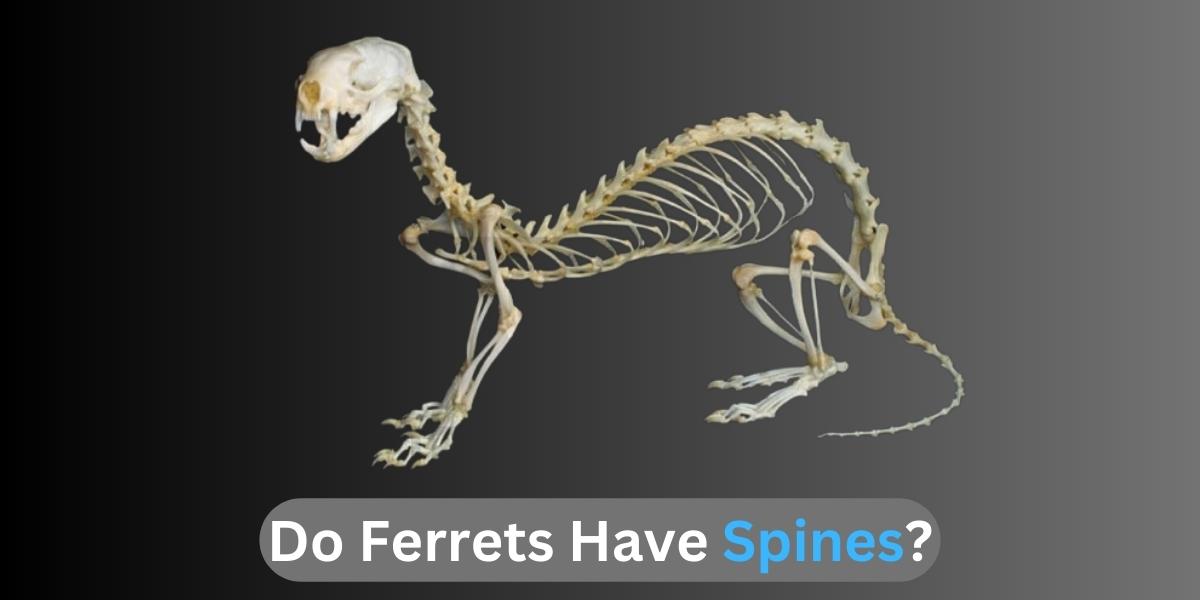Ferrets are unique and playful animals that have captured the hearts of many pet owners. However, with their slender bodies and incredible flexibility, it’s natural to wonder if these creatures have spines. In this article, we will explore the fascinating world of ferrets, their anatomy, and the role their spines play in their lives.
What Are Ferrets?
Ferrets are small, carnivorous mammals belonging to the Mustelidae family, which also includes weasels, otters, and minks. Their playful nature and curious personalities make them popular pets.
Ferret Characteristics
Ferrets typically have long, slender bodies, short legs, and sharp, pointy faces. They have a keen sense of smell and hearing but relatively poor eyesight. Ferrets come in various colors, from albino to sable, and can weigh between 1.5 to 5 pounds.
Domesticated vs. Wild Ferrets
Domesticated ferrets, known scientifically as Mustela putorius furo, have been bred as pets for centuries. The European polecat, Mustela putorius, is their wild counterpart, and domesticated ferrets are thought to have originated from them.
Ferret Anatomy
Understanding ferret anatomy is essential for the proper care and handling of these delightful creatures.
Skeletal Structure
Ferrets have a similar skeletal structure to other mammals, with a skull, spine, ribcage, and limbs. Their bones are relatively small and delicate, allowing for their characteristic agility.
Muscular System
Ferrets have a strong muscular system that enables them to move quickly and efficiently. Their muscles are especially powerful in their neck and spine, allowing them to twist and turn with ease.
Unique Features
Ferrets are well-adapted to their natural environments, with long bodies that help them navigate tight spaces, such as burrows, and powerful jaws for capturing prey.
Do Ferrets Have Spines?
The Ferret’s Spine
Yes, ferrets do have spines! Their spine, also known as the vertebral column, is made up of individual vertebrae and intervertebral discs that protect the spinal cord and provide support for the body.
Flexibility and Function
Ferrets are known for their impressive flexibility, which can be attributed to the high number of vertebrae in their spine. This flexibility allows them to twist and bend their bodies with ease, making them excellent hunters and agile pets.
Ferret Care and Handling
Proper Handling Techniques
When handling your ferret, it’s important to be gentle and mindful of its spine. Support their body by placing one hand under the chest and the other hand under the hips. Avoid holding them by the scruff of the neck alone, as this can put unnecessary strain on their spine.
Preventing Injuries
To protect your ferret’s spine, ensure they have a safe environment to play in. Avoid letting them jump from high surfaces, as this can lead to injuries. Provide them with appropriate toys and climbing structures that cater to their natural instincts while minimizing the risk of harm.
Common Spinal Issues in Ferrets
Spinal Injuries
Ferrets can experience spinal injuries due to falls, rough handling, or accidents. Signs of injury may include lethargy, pain, or difficulty moving. If you suspect a spinal injury, consult a veterinarian immediately.
Degenerative Disorders
Ferrets can also suffer from degenerative spinal disorders, such as intervertebral disc disease, which can result in pain, weakness, or even paralysis. Regular check-ups with a veterinarian can help monitor and manage these conditions.
Veterinary Care for Ferrets
A well-informed and experienced veterinarian is crucial for the health and well-being of your ferret. Routine check-ups, vaccinations, and preventive care can help ensure a long, happy life for your pet. In case of any concerns regarding your ferret’s spine or overall health, consult your veterinarian promptly.
Conclusion
In conclusion, ferrets do have spines, and their unique anatomy allows them to be incredibly flexible and agile creatures. Proper care, handling, and veterinary attention are essential to maintain the health and happiness of these fascinating pets.
FAQs
How many vertebrae do ferrets have?
Ferrets have between 40 and 44 vertebrae, depending on the individual. This high number of vertebrae contributes to their remarkable flexibility.
Can ferrets suffer from spinal issues?
Yes, ferrets can experience various spinal issues, such as injuries and degenerative disorders. Regular veterinary care is essential for monitoring and managing these conditions.
How do I pick up my ferret without hurting its spine?
To pick up a ferret without causing harm, place one hand under the chest and the other hand under the hips, supporting the entire body. Avoid holding them by the scruff alone, as this can put a strain on their spine.
Are there specific toys or play structures recommended for ferrets?
There are many toys and play structures designed specifically for ferrets, such as tunnels, hammocks, and climbing structures. Ensure the toys are safe and appropriate for their size and activity level.
How often should I take my ferret to the veterinarian?
Ferrets should have routine check-ups with a veterinarian at least once a year. However, if you notice any changes in their behavior or health, consult your veterinarian right away.

